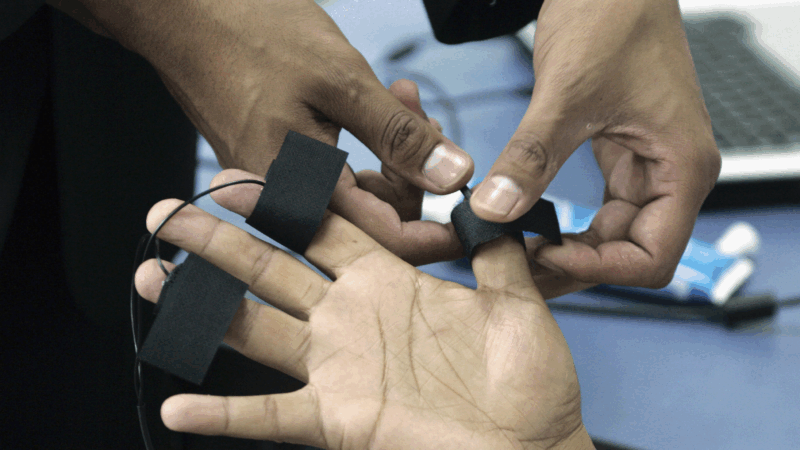The FBI and other agencies are using polygraphs to find leakers. But do they work?
Federal agencies have stepped up their efforts over the past few weeks to find potential leakers, and some — like the FBI, the Department of Homeland Security and the Department of Defense — are turning to polygraphs to help with the search.
On Tuesday, the FBI confirmed to NPR that it has started using polygraph tests to track down employees who may have been leaking information to the press.
When asked about the use of polygraph exams, DHS Assistant Secretary for Public Affairs Tricia McLaughlin said in a statement, “The Department of Homeland Security is a national security agency. We can, should, and will polygraph personnel.”
McLaughlin added that suspected leakers will be prosecuted “to the fullest extent of the law.”
Last month, Department of Defense Chief of Staff Joe Kasper said in a memo, “The use of polygraphs in the execution of this investigation will be in accordance with applicable law and policy,” referring to an ongoing probe into unauthorized disclosures of national security information. The DOD has not confirmed whether any polygraph tests have been conducted so far.
Polygraph tests have long played a role in criminal investigations, for security clearances, and pre-employment screenings, but their reliability and accuracy have been the subject of debate for decades.
Here’s what to know.
What a polygraph test is and isn’t
The modern polygraph was invented a little over a century ago by a police officer in Berkeley, Calif. That officer, John Larson, was inspired by the work of psychologist William M. Marston, who is also credited with creating the DC Comics superhero Wonder Woman and her golden Lasso of Truth.
The polygraph was later refined by another Berkeley cop, Leonarde Keeler, and it quickly spread to police departments across the country.
Although the polygraph was initially hailed as a machine that could tell if a person was telling the truth, today, polygraph examiners say the exam should not be synonymous with a “lie-detector test.”
“The polygraph does not detect lies,” said Thomas Mauriello, a former agent with the Department of Defense who has conducted about 1,200 polygraph tests.

He added, “ When we perceive a threat, either a physical threat or a psychological threat, our physiology changes and the polygraph detects those changes in the body.”
The test looks for changes in a person’s heart rate, blood pressure, breathing and sweat activity — the rationale being that lying could increase a fight-or-flight response. But over the decades, research has demonstrated that polygraphs can be inconsistent and not a suitable tool for assessing truthfulness.
Mauriello, a senior lecturer at the University of Maryland, said in his experience, people’s sympathetic nervous system could be activated by a host of reasons — beyond deception.
“When you see a reaction, it doesn’t necessarily mean that they’re lying,” he added.
How they work
The polygraph exam usually entails three parts, according to Alan Saquella, a certified polygraph examiner and professor at Embry-Riddle Aeronautical University.
First comes the pre-test, in which the examiner gathers information from the subject. Then, there’s the actual test, which includes around a dozen questions, with a short pause before the interviewee answers. Finally, there’s a post-test, when the interviewee has the opportunity to talk through some of their results.
Saquella said it’s natural for people to be anxious amid the exam, but examiners take steps to alleviate nervousness, like providing the list of questions beforehand and starting with simple, innocuous questions.
“Even in the pretest interview, everyone’s going to be nervous,” he said. “What we’re looking for is a deviation from that norm.”
While polygraph tests are used by police and federal agents, most private employers in the U.S. are not allowed to administer the exam to employees per federal law. Generally, tests are also not admissible in federal court.
Should polygraphs be used to investigate leaks? Experts weigh in
Saquella, who has conducted polygraph tests on police candidates and attorneys, said exams can be a helpful investigative tool but they should not be the “end-all.” He also cautioned against federal agencies using the test too broadly.
“One, you don’t have resources, doesn’t make good sense, and it’s certainly not good for morale when you’re just randomly pulling people,” he said.
Mauriello said the technology could be a helpful step in investigations, but stressed that polygraphs are the most effective not for detecting a lie, but for triggering someone to confess or disclose information.
“ I’ve had more people confess to stuff before I even put the attachments on them,” he said. “ Sometimes people come in to take a polygraph, they have stuff that they don’t want to talk about, and they end up talking about it.”
U.S. unexpectedly adds 130,000 jobs in January after a weak 2025
U.S. employers added 130,000 jobs in January as the unemployment rate dipped to 4.3% from 4.4% in December. Annual revisions show that job growth last year was far weaker than initially reported.
Greetings from Mexico City’s iconic boulevard, where a dog on a bike steals the show
Every week, more than 100,000 people ride bikes, skates and rollerblades past some of the best-known parts of Mexico's capital. And sometimes their dogs join them too.
February may be short on days — but it boasts a long list of new books
The shortest month of the year is packed with highly anticipated new releases, including books from Michael Pollan, Tayari Jones and the late Nobel laureate Mario Vargas Llosa.
Shootings at school and home in British Columbia, Canada, leave 10 dead
A shooting at a school in British Columbia left seven people dead, while two more were found dead at a nearby home, authorities said. A woman who police believe to be the shooter also was killed.
Trump’s EPA plans to end a key climate pollution regulation
The Environmental Protection Agency is eliminating a Clean Air Act finding from 2009 that is the basis for much of the federal government's actions to rein in climate change.
The U.S. claims China is conducting secret nuclear tests. Here’s what that means
The allegations were leveled by U.S. officials late last week. Arms control experts worry that norms against nuclear testing are unraveling.







